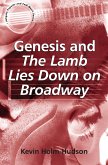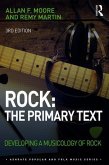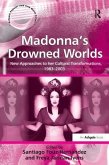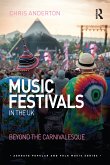David SanjekPutting Words To American Popular Music
Stories We Could Tell
Putting Words To American Popular Music
Herausgeber: Halligan, Benjamin; Attah, Tom; Duffett, Mark
David SanjekPutting Words To American Popular Music
Stories We Could Tell
Putting Words To American Popular Music
Herausgeber: Halligan, Benjamin; Attah, Tom; Duffett, Mark
- Broschiertes Buch
- Merkliste
- Auf die Merkliste
- Bewerten Bewerten
- Teilen
- Produkt teilen
- Produkterinnerung
- Produkterinnerung
"Stories We Could Tell:Putting Words to American Popular Music" identifies eight typical strategies used when critics and historians write about American popular music, and subjects each to forensic analysis. This posthumous book is a unique work of cultural historiography that analyses, catalogues, and contextualizes music writing.
Andere Kunden interessierten sich auch für
![Genesis and The Lamb Lies Down on Broadway Genesis and The Lamb Lies Down on Broadway]() Kevin Holm-HudsonGenesis and The Lamb Lies Down on Broadway63,99 €
Kevin Holm-HudsonGenesis and The Lamb Lies Down on Broadway63,99 €![Rock: The Primary Text Rock: The Primary Text]() Allan MooreRock: The Primary Text182,99 €
Allan MooreRock: The Primary Text182,99 €![Madonna's Drowned Worlds Madonna's Drowned Worlds]() Santiago Fouz-HernandezMadonna's Drowned Worlds195,99 €
Santiago Fouz-HernandezMadonna's Drowned Worlds195,99 €![Music Festivals in the UK Music Festivals in the UK]() Chris AndertonMusic Festivals in the UK60,99 €
Chris AndertonMusic Festivals in the UK60,99 €![Blackface Minstrelsy in Britain Blackface Minstrelsy in Britain]() Michael PickeringBlackface Minstrelsy in Britain74,99 €
Michael PickeringBlackface Minstrelsy in Britain74,99 €![The Songs of Joni Mitchell The Songs of Joni Mitchell]() Anne KarppinenThe Songs of Joni Mitchell67,99 €
Anne KarppinenThe Songs of Joni Mitchell67,99 €![Genesis and The Lamb Lies Down on Broadway Genesis and The Lamb Lies Down on Broadway]() Kevin Holm-HudsonGenesis and The Lamb Lies Down on Broadway201,99 €
Kevin Holm-HudsonGenesis and The Lamb Lies Down on Broadway201,99 €-
-
-
"Stories We Could Tell:Putting Words to American Popular Music" identifies eight typical strategies used when critics and historians write about American popular music, and subjects each to forensic analysis. This posthumous book is a unique work of cultural historiography that analyses, catalogues, and contextualizes music writing.
Hinweis: Dieser Artikel kann nur an eine deutsche Lieferadresse ausgeliefert werden.
Hinweis: Dieser Artikel kann nur an eine deutsche Lieferadresse ausgeliefert werden.
Produktdetails
- Produktdetails
- Ashgate Popular and Folk Music Series
- Verlag: Taylor & Francis Ltd
- Seitenzahl: 242
- Erscheinungstermin: 30. Juni 2020
- Englisch
- Abmessung: 156mm x 231mm x 20mm
- Gewicht: 406g
- ISBN-13: 9780367586195
- ISBN-10: 0367586193
- Artikelnr.: 67094620
- Herstellerkennzeichnung
- Libri GmbH
- Europaallee 1
- 36244 Bad Hersfeld
- gpsr@libri.de
- Ashgate Popular and Folk Music Series
- Verlag: Taylor & Francis Ltd
- Seitenzahl: 242
- Erscheinungstermin: 30. Juni 2020
- Englisch
- Abmessung: 156mm x 231mm x 20mm
- Gewicht: 406g
- ISBN-13: 9780367586195
- ISBN-10: 0367586193
- Artikelnr.: 67094620
- Herstellerkennzeichnung
- Libri GmbH
- Europaallee 1
- 36244 Bad Hersfeld
- gpsr@libri.de
David Sanjek (1952-2011) was Professor of Popular Music and Director of the Music Research Centre at the University of Salford, Greater Manchester, England. He was considered to be a world expert in this field. Professor Sanjek received his B.A. in English and Philosophy from Connecticut College and his MA and PhD in Literature from Washington University in St Louis. He was an enthusiastic scholar and much-loved teacher who published widely on popular music, film, media studies, copyright law and popular culture. Alongside his father, Russell Sanjek, David produced the first comprehensive written history of the American music industry, American Popular Music and Its Business: The First Four Hundred Years (OUP, 1988). Between 1991 and 2007, David was Director of the Archives at Broadcast Music, Inc. (BMI). He was also the President, Vice-President and Secretary of the U.S. Branch of the International Association for the Study of Popular Music (IASPM). Professor Sanjek also served as an advisor to many organisations, including The Library of Congress, The Rock and Roll Hall of Fame, The Rhythm & Blues Foundation, The Blues Foundation, The Center for Black Music Research, The Experience Music Project Museum, The National Endowment for the Humanities and on several committees for the National Academy of Recording Arts and Sciences (NARAS). Professor Sanjek's legacy continues to inform popular music scholarship. The David Sanjek Memorial Graduate Student Paper Prize is offered annually by IASPM-US. At the time of writing, the David Sanjek Archive, which consists of many thousands of books, journals, papers, records and assorted audio and visual media artefacts, is in preparation at University of Salford. It is hoped that this archive will form a valuable resource for current and future scholars in the fields of popular music, film, literature and theatre. Dr Benjamin Halligan is the outgoing Director of Postgraduate Research Studies for the College of Arts and Social Sciences, University of Salford, and incoming Director of the Graduate College, University of Wolverhampton (from November 2015). Publications include Michael Reeves (Manchester University Press, 2003) and Desires for Reality: Radicalism and Revolution in Western European Film (Berghahn Books, 2016). Co-edited collections include Mark E. Smith and The Fall: Art, Music and Politics (Ashgate, 2010), Reverberations: The Philosophy, Aesthetics and Politics of Noise (Continuum, 2012), Resonances: Noise and Contemporary Music (Bloomsbury, 2013), The Music Documentary: Acid Rock to Electropop (Routledge, 2013) and The Arena Concert: Music, Media and Mass Entertainment (Bloomsbury Academic, 2015). Dr. Mark Duffett is Reader in Media and Cultural Studies at the University of Chester. His research interest is primarily in fandom and the dynamics of popular music audiences. Mark is the author of Understanding Fandom (Bloomsbury, 2013), has recently edited two special editions of the journal Popular Music and Society, and is currently writing a book on Elvis Presley for Equinox Press. Tom Attah is BMus Popular Music Course Leader at Leeds Arts University, UK. His research focusses on the effects of technology on blues music and blues culture. Dr. Attah's teaching and blues advocacy includes workshops, seminars, lectures and recitals delivered internationally. As a guitarist and singer, he performs solo, with acoustic duos and as leader of an electric band. His solo acoustic work includes his own original blues compositions and has led to performances at international music festivals. Dr. Attah's writing regularly features in specialist music publications, and his original chapters, conference papers and book reviews are published in a variety of media.
1. Blood Sausage and the Building Blocks of Memory 2. Counting Down the
Categories 3. The Instinctual Narrative 4. The Darwinian Narrative 5. The
Heroic Narrative 6. The Ritual Narrative 7. The Alluvial Narrative 8. The
Agoraphobic Narrative 9. The Manichean Narrative 10. The Mythic Narrative
Conclusion: Words Escape Me Coda: Igniting Love's Burning Coals
Categories 3. The Instinctual Narrative 4. The Darwinian Narrative 5. The
Heroic Narrative 6. The Ritual Narrative 7. The Alluvial Narrative 8. The
Agoraphobic Narrative 9. The Manichean Narrative 10. The Mythic Narrative
Conclusion: Words Escape Me Coda: Igniting Love's Burning Coals
1. Blood Sausage and the Building Blocks of Memory 2. Counting Down the
Categories 3. The Instinctual Narrative 4. The Darwinian Narrative 5. The
Heroic Narrative 6. The Ritual Narrative 7. The Alluvial Narrative 8. The
Agoraphobic Narrative 9. The Manichean Narrative 10. The Mythic Narrative
Conclusion: Words Escape Me Coda: Igniting Love's Burning Coals
Categories 3. The Instinctual Narrative 4. The Darwinian Narrative 5. The
Heroic Narrative 6. The Ritual Narrative 7. The Alluvial Narrative 8. The
Agoraphobic Narrative 9. The Manichean Narrative 10. The Mythic Narrative
Conclusion: Words Escape Me Coda: Igniting Love's Burning Coals








